Don't wanna be here? Send us removal request.
Text
KINDRED ANNOTATION III
Dana's fullest description of losing her arm occurs at the end of the seventh chapter. She has just killed Rufus after his attempt to rape her, when she finds herself transported to Los Angeles. Although he is dead, Rufus still has her arm in his death grip.
“Something harder and stronger than Rufus's hand clamped down on my arm.... Something cold and nonliving.... The wall of my living room. I was back at home-in my own house, in my own time. But I was still caught somehow, joined to the wall as though my arm were growing out of it-or growing into it. From the elbow to the ends of the fingers, my left arm had become a part of the wall. I looked at the spot where flesh joined with plaster, stared at it uncomprehending. It was the exact spot Rufus'sfingers had grasped" (260-61).
She loses her arm, apparently, between "homes"-between a past that has a claim on her and a present on which she has a claim. "Home," in Kindred, is more than a place; it signifies the liminal site where one can lose or reclaim a historically-defined modern self. As John Washington says, in David Bradley's The Chaneysville Incident, home "is a place to which you belong and which belongs to you even if you do not particularly like it or want it, a place you cannot escape, no matter how far you go or how furiously you run" (13). Both Dana's and Kevin's meditations on their travels involve a concept of home as the place they must seek and escape, must construct and avoid. When Dana returns to Los Angeles, she defines the term for herself: "Home. It didn't have to do with where I had been. It was real. It was where I belonged" (115). However, shortly after she is trans- ported back to Maryland, she is "startled to catch [herself] saying wearily, 'Home at last' " at the sight of the Weylin plantation (127). Even more ominous, though, is Rufus's insistence that Dana is "home" (143). "Home" becomes a variously significant term and concept. For Dana, it marks the place between present relations with Kevin and past relations with Rufus. For Rufus, it marks owner- ship-of property as different as the house and Dana. For Kevin, it marks the places where he and Dana can communicate
17 notes
·
View notes
Text
KINDRED WRITING I
Haile Gerima's 1993 film Sankofa confronts the legacies of slavery, highlighting the ways the past constructs the present, by cinematically transporting its viewers to that era of human bond- age. Indeed, the word sankofa is an Akan word that means "one must return to the past in order to move forward." The film opens with the protagonist, a contemporary African American fashion model named Mona, on a high fashion shoot at Ghana's Cape Coast Castle, formerly a holding site for kidnapped Africans before their one way departure through the "door of no return" to transatlantic slavery. It is obvious that Monallas forgotten her history as she happily poses for the photographer, seemingly detached from and oblivious to the implication o f the historical context o f her surroundings. Inside the castle, the spirits of the ancestors appear before her admonishing her to remember. Mona,' along with the film's viewers, is then transported through time and space to a site of North American chattel slavery. This journey affords Mona, and the viewers, the opportunity to remember and to reclaim what she, and perhaps they, have forgotten or are in danger of forgetting: their ancient properties. The film's primary themes are the critical need for recovering and righting history, as well as the necessity of understanding the powerful connections between the past, present, and future.
While Gerima's film inaugurated a cinematic trend in the 1990s of presenting the history of slavery from the perspective of the enslaved, most notably the movies, a number 'of contemporary African American women writers had already done so in their novels. In particular, science fiction writer Octavia E. Butler creates in her fourth novel, Kindred (1979), a dialectic between two specific historical moments in American history: the period of chattel slavery and the richly symbolic bicentennial year of 1976. When Mona, Gerima's protagonist, travels to the past in order to learn about the history she has forgotten or never knew, the audience does so as well. Likewise, when Butler's twentieth-century protagonist travels to antebellum Maryland, she learns how the past shaped and continues to shape the present. Butler's readers also learn the same lesson. Employing the device of time travel, like Gerima and Butler offer, from a feminist perspective, a meditation on the nature of American freedom creates a metaphoric Middle Passage between the nineteenth and twentieth centuries.
https://youtu.be/BDZjBaEu7jE
youtube
2 notes
·
View notes
Text
KINDRED ANNOTATION II
The place, the time would either kill him outright or mark him somehow.
— Dana, 77
Dana is justifiably worried that Kevin will be affected by the 19th century. She turns out to be correct, for when Kevin is left in the 1800s for five years, he is marked both physically and psychologically. There is a scar on his forehead and his demeanor is changed. It is clear he was involved in violence, but many details are left unclear to the reader. He also began to resemble, in Dana's mind, Rufus and Tom in his expressions and voice. As a white man, Kevin is not victimized by the era as Dana is, but it would be wrong to say he is unmarked.
The history of Kevin and Dana’s meeting and courtship, which takes up the first part of this chapter, gives us some insight into the current state of their relationship. When the two first meet, Kevin has all the power. He is older and more confident than Dana. He is also more successful than she is, not only because he works fulltime and Dana is only a temp but also because he is finding success in his writing career, and Dana is not. He has more money than she does, and he buys her lunch, even when she objects. Kevin’s status as a white man also gives him power over Dana. Dana is attracted to Kevin, and she allows him to woo her. Still, the power dynamics that characterize the beginnings of their relationship continue to resonate. And if Dana doesn’t have equal power with Kevin in 1970s California, she certainly does not profit by their plunge into antebellum Maryland. Once in the South, Kevin and Dana must confront the disturbing fact that in the 1800s, their playacting at being master and slave could have been a reality. While Butler wants us to look beyond the interracial aspects of Kevin and Dana’s relationship—it is not until this section of the novel, for example, that we find out for sure that Kevin is white—she stresses that even progressive, forward-thinking interracial couples feel the aftershocks of slave-era concepts of mastery.
0 notes
Text
KINDRED ANNOTATION I
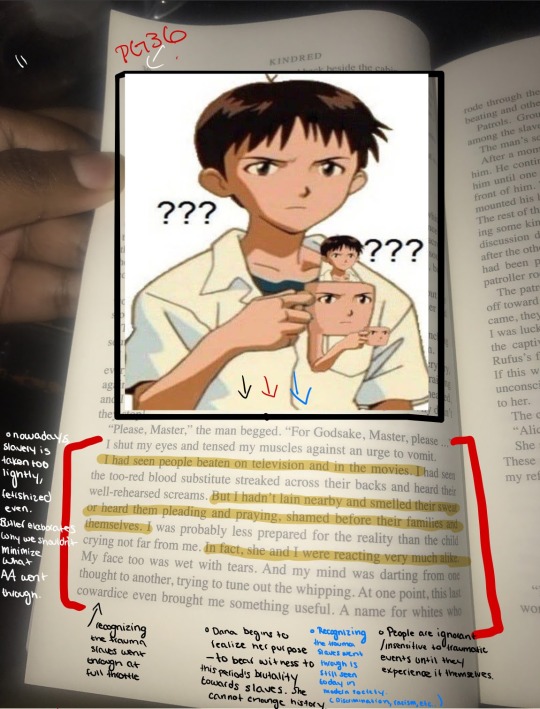
“I had seen people beaten on television and in the movies. I had seen the too-red blood substitute streaked across their backs and heard their well-rehearsed screams. But I hadn't lain nearby and smelled their sweat or heard them pleading and praying, shamed before their families and themselves. I was probably less prepared for the reality than the child crying not far from me. In fact, she and I were reacting very much alike.” pg 36
Much of the novel focuses on the many ways that American slaves faced incredible emotional and physical pain throughout the history of the American slave states. Rather than using the enslaved characters as simple objects for displaying the horrors of slavery, Butler takes care to make each of her black characters nuanced and complicated human beings. By giving the awful facts of oppression and harm human faces, Butler acknowledges both the pain inflicted in the past and the pain of forgetting or minimizing what African American ancestors endured when this history is reduced to statistics and stereotypes.
By actually traveling back in time, Dana is forced to grapple with the insane violence of slavery instead of passively reading about it or pretending that it didn’t happen in order to go on with her life. Butler gives a voice to the aspects of slavery that others try to sanitize for a present day audience in the name of “moving on.” Recognizing that the trauma of slavery continues to affect the descendants of slaves in the present day, as seen in the racial discrimination that Dana faces at her job and the resistance to interracial relationships that Dana and Kevin encounter, Butler stresses the importance of understanding the past in order to come to terms with histories of trauma rather than ignoring past violence in a foolhardy attempt to erase those wrongs. In fact, Butler gives support to the old proverb, “those who do not know history are doomed to repeat it” by marking the similarities between the centuries of American slavery practices and the crimes against the Jewish population in Europe during the Holocaust. The historical practices of slavery offered a model for oppression later followed by tyrants, which would continue as long as people remain ignorant to the real horror faced by oppressed groups in the past. Dana’s wounds in the past and the loss of her arm physically bring this trauma back to the present, making it clear how much trauma in the past influences the lives of those in the present.
Kindred as a whole does not attempt to rewrite history or cast the burden of slavery in a new light, but instead testifies to the pain that slaves went through and honors the sacrifices and trauma they had to live through so that African Americans in the present could have a chance at a better life.
0 notes
Text
READING KINDRED V.
Dana and Rufus might look like friends from the outside, but Danas feelings for him are quite different from what we think of them. Dana sees Rufus as a child needing or relying upon her protection, for instance, when Dana saved him from drowning in the river. She views him as a man of his time. In another words, Rufus’s personality is the way that any other man would have been in that period of time towards his slaves. He is a ruthless and vicious slaveholder, which is mostly Tom Weylins fault. Just as Tom’s behavior on the slaves and on his son.
As a child Rufus started depending on Dana. His survival was left in the hands of Dana. Just as when Dana went back to the past the first time to save Rufus from drowning in the river. "I reacted to the child in trouble". Also, Rufus depended on her to be his companion. Even more, when Alice killed herself and Dana came back to the past the last time and saw what happened Rufus told her "dont leave, Dana". As Rufus grew older he never really learned to take good care of himself.
0 notes
Text
READING KINDRED IV.
In Octavia Butler's Kindred, Dana unfortunately discovers the significant similarities between her trusted husband, Kevin, and her corrupted ancestor, Rufus. Both Rufus and Kevin have the privilege of being white males, which is to their advantage in slave times. Also, both Kevin and Rufus appear to share a bond with Dana. Both men care for her and want the best for her.
Both Rufus and Kevin were white males. This worked to their advantage because white males have the most power in slavery times. This also helps Dana because Kevin acts as her master and she is safe. The downfall of this was that, in acting as her master, Kevin is sometimes forced to treat Dana in ways he would not normally treat her so that the arrangement will be believable. A second negetive thing about Dana's and Kevin's races was that it was illegal for them to be married in the slavery times. They usually have to hide this from most of the whites.
Although Rufus and Kevin both loved Dana, they expressed their love in quite opposite ways. Rufus's actions do not represent, so to say, actual love. He expresses his "love" by attempting to satisfy his urges by force. In other words, he rapes his objects of affection without guilt. On the other hand, Kevin, Dana's husband, would never attempt to force Dana into anything of this sort. He is scared Dana will be hurt more than she already is. Because of the times and how he was brought up, Rufus always considers Dana to be lower class than himself. Despite the times, Kevin always considers Dana an equal to himself.
0 notes
Text
READING KINDRED III.
In Kindred, when Dana travels back in time to the age of American slavery, she knows she's going to encounter some violence. What she doesn't realize is just how much this violence has become a part of everyday life for the slaves she meets. It doesn't take long for this violence to find its way to her, either. Whether it's Tom Weylin pointing a shotgun in her face, whipping her, or kicking her, Dana has almost no option for asserting her rights as an individual without some white person hurting her. It doesn’t matter if it's gender, race, or class, nearly all the relationships in this book cause us to stop and think about how power influences every aspect of our experience and the experiences of those around us. Power can make us do insane things and it can make us do great things. The trick is to remember which is which, especially when power works so hard to cloud our judgment and forces us into hasty decisions.
1 note
·
View note
Text
II. READING KINDRED
Going back to the first pages of Kindred I can tell from the opening lines that Dana has gone through an experience that has left a deep impression on her. The fact that's she's lost an arm is kind of a giveaway. On top of that, Dana tells us: "And I lost about a year of my life and much of the comfort and security I had not valued until it was gone" (Prologue.2). So it's clear that Dana can no longer be the same woman she used to be. She can never feel comfortable or safe again, at least not in the way she used to. And once we find out about how she's been travelling back in time to American slave times, we get a pretty good sense of why.
Apart from the physical pain of working in the fields and being whipped, Dana must also deal with the emotional pain of being a modern black woman making her way in a slave-based culture. She feels constant shame for the way she gives into this culture. She always feels as though she should put up more of a fight whether it gets her whipped or not. Even when she tries to escape the Weylin plantation, she shames herself for not making a cleaner getaway, thinking: "I knew about towns and rivers miles away—and it hadn't done me a damned bit of good! What had Weylin said? That educated didn't mean smart. He had a point" (4.12.42). Even with a hundred and fifty years of historical knowledge to help her, Dana can't find a way to crack the system.
Eventually, other black slaves start shaming Dana for giving into the white masters so easily. Alice is especially insulting when she says, "You run around fetching and carrying for that [white] woman like you love her. And half a day in the fields was all it took" (5.7.24). In other words, the slaves accuse Dana of being a traitor to black people everywhere. She has the ability to put up more of a fight, but she won't because she's afraid of getting hurt.
I feel as though this cements the divide between Dana, the slaves, and the white people. While she can understand and empathize the pain of being a slave, she knows that she always has a home she can return to, that where she comes from is free of submission to white supremacy. Moreover, her privileged lifestyle is detected by the slaves. They know she’s different from them immediately by the way she speaks. Too white. On the other hand, the white people during that time don’t like Dana either. The fact that she can read, write and speak properly is considered a threat to their power and pride. Their ideaogy of black people treated as subhumans because they don’t acquire the same knowledge as them is tested when Dana appears. No matter what, Dana—and the slaves— will never be seen as equals until much later.
Even in modern society, her family shames her for marrying a white man (Kevin). Her uncle claims she’s betraying him for not marrying someone that looks like him, skin-wise, and her aunt is semi-fine with it because Dana can finally conceive light-skinned babies since she’s too dark. I feel as though these comments establish both colorism and the idea that you’re not black enough if you do x, y, or z. I’ve experienced it and I’m pretty sure many black women have as well. It demeans what those slaves went through. No matter how dark or light your skin tone is, you were still receiving the fall of the whip.
0 notes
Text
I. READING KINDRED
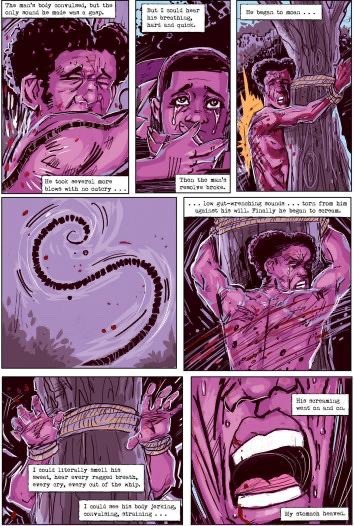
I know I was supposed to make posts during my adventure of reading through Kindred, but I literally read and finished the whole thing in a day. I also read the graphic novel of it to see if I missed any key concepts while reading. The story was immersive and captivating. I saw just what kind of world the protagonist, Dana, was thrown into, and when I scanned through the last page I was left unsettled. BUT ANYWAY—through these impending posts I’ll refer back to the themes that I found when skimming through Kindred.
First off, Kindred starts begins it’s tale with a young black woman who is mysteriously transported to the antebellum American South, where she must adapt to a society in which the vast majority of black people are slaves and where she too confronts enslavement. In order to survive, she must acquire basic skills that, as a modern woman, she has never learned, including cooking on an open hearth, sewing, and doctoring without the benefit of modern medicines or antisepsis. She must also determine whether she has the strength of character required for survival in a world that is rough and crude, in which black people are believed to be subhuman and are kept as cattle, and where physical and psychological punishments are daily tribulations.
It took me a while (and multiple readings) to understand the intricate constellations of power Butler crafts with Dana’s story partially because there was only so much of Kindred that I could visualize as a teenager. TV shows and movies about slavery are a Thing™, but a narrative like Kindred that incorporates time travel, temporal paradoxes, and critical race theory is a wholly different experience made stronger with artwork.
Kindred’s exploration of how power situates itself at the various intersections of race, sex, class and wealth have made it one of Butler’s most iconic and widely-read novels and its new illustrated counterpart honors that legacy well. But where the original Kindred asked you to envision Dana’s worlds in your mind’s eye, the graphic novel draws you in immediately with Jennings’ distinctive art style. It transforms Kindred’s story into something that’s instantly immersive and, ultimately, the perfect gateway to the rest of Butler’s work.
0 notes
Text
I. RESEARCH PROJECT—CHOOSING THE BOOK
When deciding which book to read for my final AP Lit project, Kindred by Octavia Butler wasn’t my first choice. In fact, I didn’t even know this book existed until Kreinbring recommended it to me. I was worried that scholarly fiction would be a drag to read, but this book has really piqued my interest.
I’ll admit, when I bought Kindred on Amazon, I was immensely underwhelmed by the cover. With a slight eye-roll, my exact thoughts were, “Wow..Another book about slavery..” Don’t get me wrong, I know my history and it will forever be apart of me, but the way african american slavery is portrayed in current media, I feel as though the topic is fetishized. Not too long ago I watched a show on Netflix where the black female lead witch fell in love with her slave owner despite time-traveling to modern society and experiencing first hand what life would be like without slavery. She wanted to go back to her timeline and be with the very person who considers her to be less than him and be content with her enslaved lifestyle. I was frustrated with the outcome of that show, so when I came across this book my expectations were already worn and burnt out.
HOWEVER—Kindred seems to diverge from that stockholm syndrome trope and focuses more on the ancestral aspects of slavery (hint: kindred). Similar to the netflix show, the main protagonist accidentally time travels to the early 1800s and soon finds out she’s in the same timeline as her ancestors, one of them being a white man, and has to maintain the past events so she can still exist in the future. I can’t say I’m 100% certain this book won’t fall into the same trope or somehow make it worse, but the writing style is interesting enough. I’ll keep my fingers crossed.
0 notes
Text
IV - Trojan

Ocean Vuong obscures the binaries of masculinity and femininity during times of chaos, as seen in “Trojan.” The poem pulls the reader into turmoil, juxtaposing the beauty of the boy:
“The dress / petaling off him like the skin / of an apple.”
Violence and beauty are taken together as an expressive inner-battle, relying on the allusion of the wooden horse from the Trojan War. The boy hides inside himself like the soldiers hide inside the wooden horse, and together the boy and soldiers deceive those against them, yet the boy faces his own downfall:
“How easily a boy in a dress / the red of shut eyes / vanishes / beneath the sound of his own / galloping.”
The boy falling under his own “galloping” can be pointing to the death of his own identity. It is only when he is, “the wind, they will see him.” The boy, who falls under himself, travels through the spectrum of gender and seemingly becomes his own martyr, a symbol of visibility.
Vuong’s poetry isolates itself on the page, finding seclusion to be a powerful force for thinking, imagining, and empowering. His ability to explore the ambiguity that lies beneath the superficial, inspires readers to investigate the possibilities.
https://youtu.be/eYmDjdKTpuE
youtube
This poem immensely reminded me of this song. A cacophony of noise that sounds like something that could be played in a battle scene. And that’s the underlying tone of Trojan; a war against oneself, fighting until the very end.
3 notes
·
View notes
Text
C h e a t
For this week’s post, I’m reviewing Rachel’s poet, Chelsea Dingham! (Sorry Ocean :()
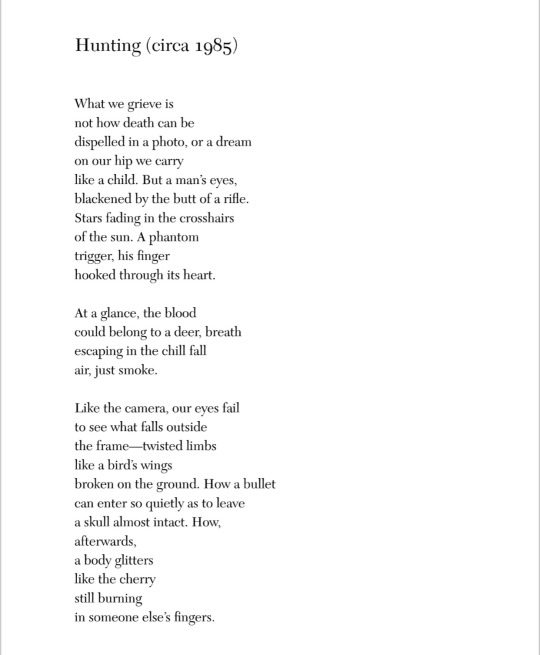
Poetry from another poet you’re not as familiar with is one of the most difficult subjects to review as they in the most cases by their very definition are personal, spelling out, thoughts and emotions to reader their trying to compel. I don’t know what drew Rachel to Dingham, but on my perspective, the dark themes and melancholy despite having a simple naturalistic cover page made me do a few double takes.
The collection of poetry is raw and the poems herein tare at your very soul, some of these poems deal with the death, including the loss of children. It deals with molestation, suicides, hits and runs, this short collection of poetry is not short on its impact.
The books in this collection by Chelsea Dingman alternates from her childhood and adulthood paralleling her life as a child to that of her children, it speaks not only of sorrow and loss, but of determination and overcoming.
Her line breaks do not necessarily follow her sentences, a characteristic of her art that separates her from other artists. Her themes, her narrative, even the way she chooses to show her story make her unique and irreplaceable. Dingman and her work made me realize, once again, how much I love free verse poetry. I actually believe it’s harder to write than regular poetry (the one that actually rhymes), and I find it much more satisfying. Its inner rhythms and pacing can be manipulated into making you feel angry, sad, even happy, nostalgic or euphoric. It has a certain strength and power within it that I admire, and I found Dingman’s work to be a prime example of modern free verse poetry.
I picked this picture to further illustrate the theme of death Dingham displays in a lot of her works.

7 notes
·
View notes
Text
That’s so weird your mentor poet doesn’t include titles. I’ve seen it before in some poets but I find it unsettling when they don’t. It’s like choosing to not write your name when you take a test; you can’t turn it in like that. While I was in elementary school, I’ve always been taught that titles is the writer’s “way in” into their poem, but I suppose that poets like yours would rather spice things up a little. Anyway, I like how you connected the theme of earth and peace to you listening calming rain sounds. I can painfully relate to that, I can’t fall asleep without using this app on my phone that can play white noise or other strange background sounds. It makes me feel anxious when all I can hear is complete utter silence, I don’t like being totally immersed and alone in my thoughts. It’s an anti stresser when I can hear that the world (or the earth) isn’t frozen in place; that life is still moving and changing and hasn’t left you behind. Hearing noise grounds me in a way and I’m glad I can share that connection with you and your mentor poet!
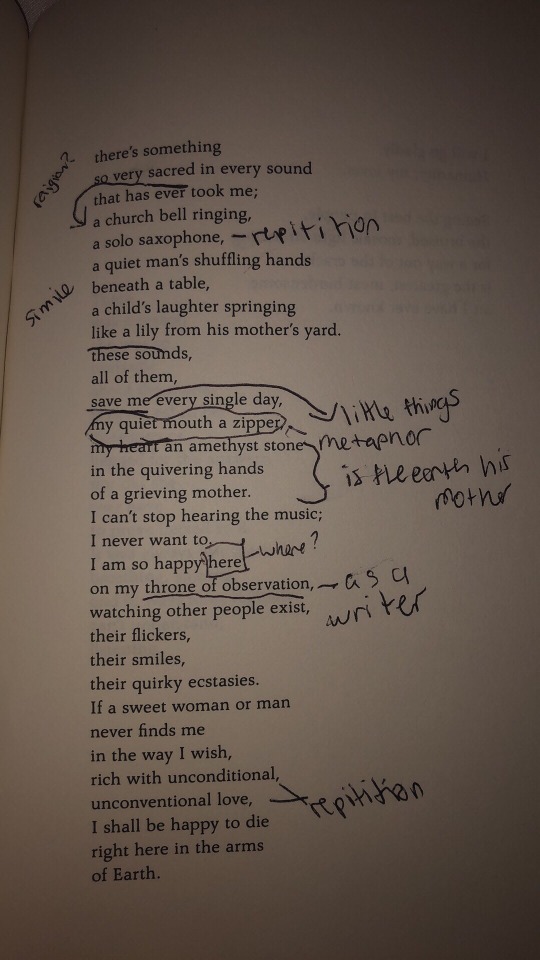
Like all poems in this book, there are no titles for each poem. But I really wish there was. I wish that each poem could have that small summarization given to it by the author. With this poem, I want to know how Poindexter would have summarized it. What’s the most important part? The emphasis on sound? The references to nature or the part about love at the end. As the reader, the part that stuck with me the most was the very end where he says he would be “happy to die right here in the arms of the Earth.” It gave me a feeling of envy. I wish that I could have that sense of peace with myself and the world. I wonder if that was what the author wanted me to hold on to or if it was the description of sounds. His two examples of church bells and a saxaphone confuse me to be honest. Why those two things? To me, they don’t have any relation. I wonder why that was two so I ss the author found important. It makes me wonder if the author is religious or not. Another part that really stuck out to me was when he says “my throne of observation.” I think it is such an accurate metaphor for how he sees the world as a writer and how he writes about it. At the same time, I wonder why he metaphorically puts himself on a throne.
When I was reading this, I started to think of sounds that make me feel connected to the earth and at peace. My favorite sound is rain. Or really any water sounds like waves or moving water. The clearness of water is so pretty and innocent to me and the way it makes sound even though it isn’t alive is just so beautiful. Hearing rain makes me so happy and calm which is what I think Poindexter was trying to describe.
3 notes
·
View notes
Text
“Immigrant Haibun” Ocean Vuong
https://www.google.com/amp/s/genius.com/amp/Ocean-vuong-immigrant-haibun-annotated
Continuing through the book, I began to take notice of the form, word choice, themes in each poem. I began to anticipate surprise. There are so many turns in this book; surprise is one of the only things that can be anticipated. One of the first big jolts that I encountered from Night Sky With Exit Wounds (formally) was the poem “Immigrant Haibun.” The poet extends his lines across the page and writes in big prose blocks. It was not a form that I first expected. Here is an excerpt of Ocean playing with prose in “Immigrant Haibun”:
“Then, as if breathing, the sea swelled beneath us. If you must know anything,/know that the hardest task is to live only once. That a woman on a sinking//ship becomes a life raft— no matter how soft her skin…”
As a poet, Ocean shifts into prose and out of prose. He writes in couplets and creates his own forms. The form of the poems are so constantly and originally inventive. Ocean even created his own rules for the section breaks in this book too. In the lines above, and throughout the book, is full of intelligence and versatility. Vuong’s poems, written with intelligence and tenderness, offer new spaces for becoming, where the self questions its borders, remakes itself at the threshold of language.

I thought this picture related to Vuong’s poem because I noticed a theme in water and nature and every time he mentioned the ocean—or something water related, it’s described as violent or angry. So I thought it was the good idea to reanimate that reiteration of the sea.
10 notes
·
View notes
Text
“The Gift” - Ocean Vuong
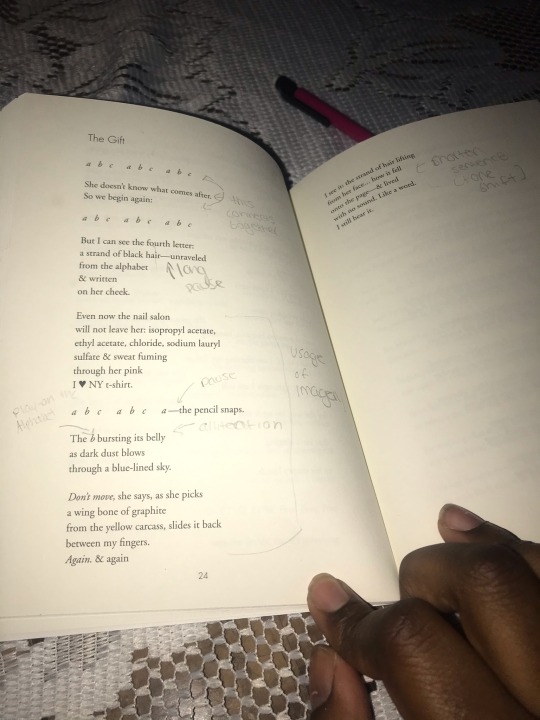
My favorite poems of Vuong’s that explores the body occur near the end of the collection. Parts of the body—tongues, teeth, eyes, feet, knees, backs, heads, hands, blood—all get frequent mention in Vuong’s poems. The language of the body becomes the body of the poem. Vuong weaves together his concerns with bodies, beauty, and language here, in “The Gift”
“a b c a b c a b c
She doesn’t know what comes after.
So we begin again:
a b c a b c a b c
But I can see the fourth letter:
a strand of black hair – unraveled
from the alphabet
& written
on her cheek.
Even now the nail salon
will not leave her: isopropyl acetate,
ethyl acetate, chloride, sodium lauryl
sulfate & sweat fuming
through her pink
I NY t-shirt.
a b c a b c a – the pencil snaps.
The b bursting its belly
as dark dust blows
through a blue-lined sky.
Don’t move, she says, as she picks
a wing bone of graphite
from the yellow carcass, slides it back
between my fi ngers.
Again. & again
I see it: the strand of hair lifting
from her face … how it fell
onto the page – & lived
with no sound. Like a word.
I still hear it.”
In this poem, the narrator is at a nail salon, teaching a mother how to write in English. I love the juxtaposition between the narrator’s and the mother’s grasp of the English language; the tenderness and the pain between them in this poem.
The body is language, language the body, and both are trying to learn, to make the unfamiliar more familiar, to navigate newness for survival.
For Vuong, language and the body are the sites for making, and language itself and the body itself are both beyond the subjects of poems, they are poems themselves. “The Gift” is only one example of how Ocean plays with language in the book—alliteration, assonance, slight rhyme. Ocean has a range of poetic techniques that he is able to deploy to heighten the music of his poems.
I honestly picked this song because it tackles the whole essence of what I take from Vuong’s poems. The breakdown of the body and the meaning he places behind them made me hear this song in this poem and some of his other works as well.
youtube
7 notes
·
View notes
Text
Introducing: Ocean Vuong
I honestly wanted to step out of my comfort zone and explore poets who write about experiences that differs in comparion as to how I was brought up. At first, nothing really stood out to me while skimming through the massive list of poets, but one name caught my eye. I can admit, I had a Tumblr phase,—I still do—and throughout my years of managing multiple accounts, Vuong constantly popped up on my feed for as long as I can remember. I didn’t know a lot about him, only that he was born on a rice farm and in a refugee camp for a year—after that it was just his poems and the imagery attached that made it much more immersive to read through. I also delved into Tina Chang because she and Vuong share dark themes in their poems. An example is shown below of how Vuong captures this essence of violence and killing and somehow makes it breathtaking. I know that a lot of his works draw back to his childhood and growing up, but I love how I can interpret and relate to his poems in my own way.
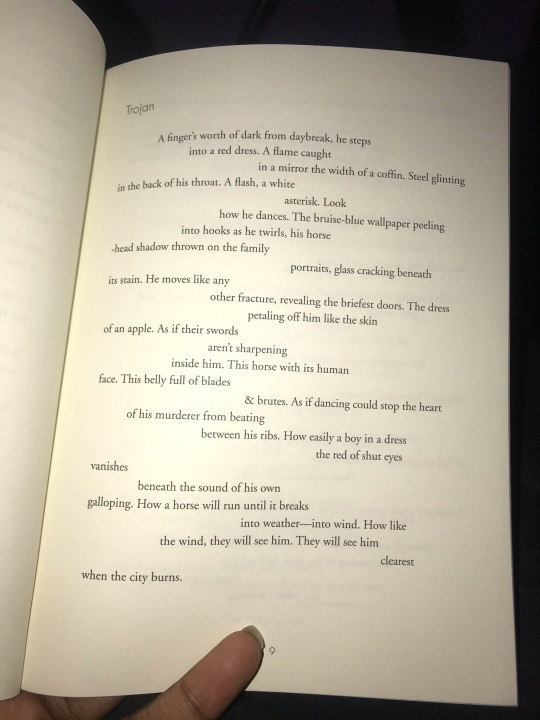
4 notes
·
View notes
Text
About an hour ago, I was in Walmart looking for my conditioner because today is wash day for my hair. As I’m looking for my product, this older white lady approaches me and she says, “Excuse me, miss. Please don’t be offended by this.” And usually when white people tell me not to be offended, 9 times out of 10, whatever they are about to say is going to be offensive af.
Anyway, she follows it up with, “My husband and I just recently won our custody battle with our foster daughter and she means the world to us. She’s a beautiful African American girl and her hair looks a lot like yours. But I’m afraid because I don’t know what to do with her hair. It’s a lot different from mines and our other children and we are at a total loss. I’ve tried looking up the YouTube videos and my husband went to the braiding shops so they can teach him how to properly braid her hair, but he’s still pretty new and it will be a while before he gets used to it. Do you have any tips you can give me? If you don’t have the time, it’s okay, really! I just needed a little advice because I want her to look beautiful.”
Y’all. swear I almost started crying on aisle 6. So for the last 30 minutes, I spent my time talking to her and what products to use and how to properly detangle and comb her hair with the proper tools and what not to do with natural hair. And I showed her a bunch of easier to follow natural hair tutorials on YouTube and saved them for her. (I also had to create a YouTube account for her so she could save it for later.) but omfg, she was so sweet, and I could tell that she listened to every single thing I had to say and she took little notes on her little notepad.
And what really filled my heart was the fact that her husband actually taking classes from African braiding shops. And she showed me a picture of him wearing a little sweater vest and loafers in a little shop surrounded by beautiful black women showing him how to braid black hair and even the lady he’s braiding on is guiding his hands. And omfg. Bless these old white people and their black daughter who I know have new loving parents because they are willing to step out of their comfort zone just to make her feel and look beautiful.
I really hope our paths cross again one day, Mrs Cicilia. 💖💕
286K notes
·
View notes